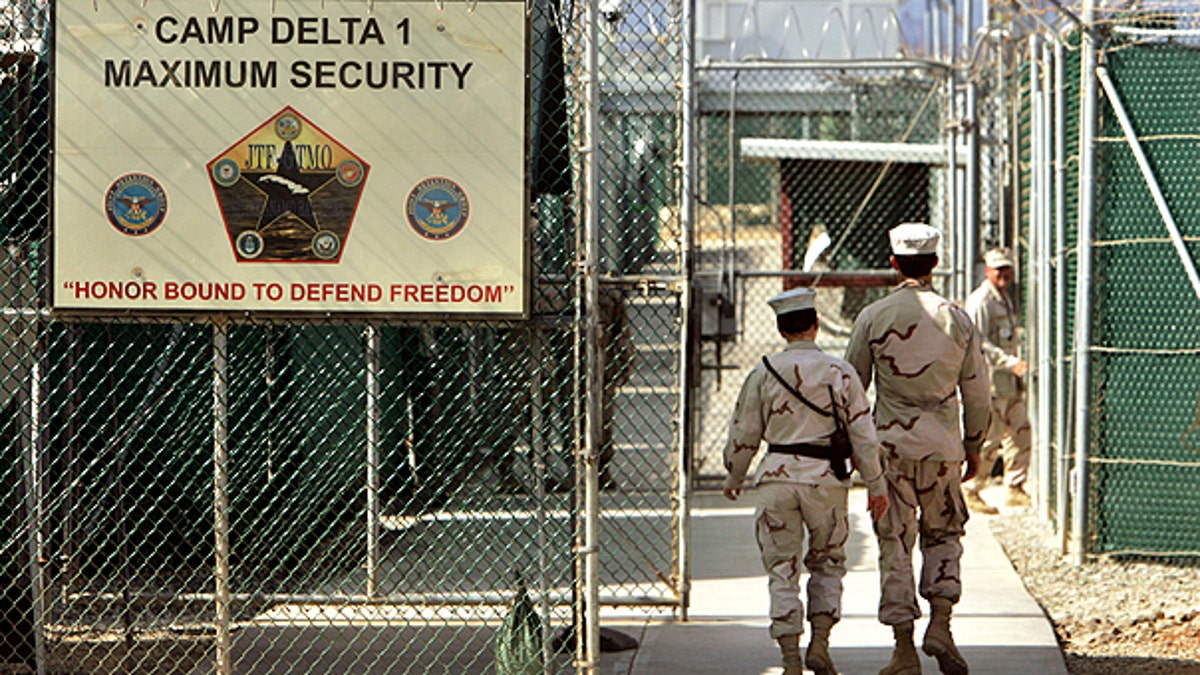
In this file photo from June 27, 2006, reviewed by a U.S. Department of Defense official, U.S. military guards walk within Camp Delta military-run prison, at the Guantanamo Bay U.S. Naval Base, Cuba. (AP)
The White House on Sunday reaffirmed its desire to follow through on President Obama's pledge to shutter Guantanamo Bay, 10 years after the Sept. 11 attacks and nearly three years after the president signed an executive order mandating the closure.
The campaign to shut down Guantanamo has been one of the most difficult challenges of Obama's presidency. He pledged in January 2009 to close it within a year -- about 170 detainees remain in the facility today.
White House counterterrorism adviser John Brennan told "Fox News Sunday" the administration is still trying to close the prison camp, while moving to transfer or prosecute the remaining detainees.
"We are committed to making sure that we do proceed on the counterterrorism front in adherence to the law, as well as consistent with the values that I think the president has articulated numerous times," Brennan said.
The administration has transferred dozens of detainees to other countries, but continues to have its hands tied by Congress.
Lawmakers have blocked the administration from transferring detainees to the U.S. Amid the standoff, the president earlier this year moved to revive military commissions at Guantanamo. Significantly, Attorney General Eric Holder backed off a decision to try Sept. 11 mastermind Khalid Sheikh Mohammed and his co-conspirators in civilian court in New York, opting instead for the overhauled military commissions.
The decisions suggest the Guantanamo camp could be up and running for months, if not years, to come. Asked earlier this year whether the camp would shutter by the end of Obama's first term, Holder told Congress: "I don't know."
Meanwhile, Guantanamo's hazy future continues to fuel concerns that the administration does not have a clear strategy for dealing with terror prisoners.
"We don't have a coherent detention policy," former Attorney General Michael Mukasey told Fox News.
Some have complained the administration is sometimes left with the option of either killing terror suspects or letting them go, because its detention policy is undefined.
Former Bush administration attorney John Yoo said that through drone attacks and other operations, the U.S. is killing terror suspects instead of interrogating them, to America's detriment. "We're losing this big trove of intelligence," he told Fox News.
Earlier this year, a top Navy official told a Senate committee that, in "many cases," terror suspects are kept on a ship, until they can be prosecuted or returned to another country.
"If we can't do either one of those, then we will release that individual," Vice Adm. William McRaven said. "That becomes the unenviable option, but it is an option."
Shortly afterward, one such prisoner -- suspected Somali militant Ahmed Abulkadir Warsame -- was forwarded to U.S. civilian court for prosecution after spending a couple months on a Navy ship. Many Republicans in Congress wanted Warsame to be sent instead to a military commission.
At the same time, some are concerned that places like Bagram Air Base in Afghanistan have become the new repository for detainees. The group Human Rights First released a report earlier this year showing the number of U.S.-held prisoners in Afghanistan has nearly tripled since Obama took office -- though that also coincides with a troop surge in Afghanistan.
Some Republicans have praised the Obama administration for keeping in place certain counterterror tools from the Bush administration. Former New York City Mayor Rudy Giuliani told Fox News he was both "surprised" and "happy" that Obama had kept and developed programs like the Predator drones.
"One thing you find, I think, as president is continuity," former Bush adviser Karl Rove said. "There are things that your predecessors, Democrat and Republican, have done that you suddenly realize are necessary to be built upon and followed through on. And as much as President Bush found that, I suspect President Obama's found that. "
But Brennan, who several days ago reiterated that the administration would not be sending any new prisoners to Guantanamo, indicated that Obama will continue to do things a little differently. He stressed that the nation has made significant gains against Al Qaeda over the past decade.
"There are certain aspects and foundation of our counterterrorism program that has been in place since 9/11 that has continued from the last administration to this administration. There also are some significant differences that we have been trying to pursue such as the (closing) of the Guantanamo," he said. "There are elements of our policy that have some distinctions from the last one, but I think what today is a special day to note is just how committed and strong and resilient this country has been against the terrorist threat and what we have accomplished in the last 10 years."




